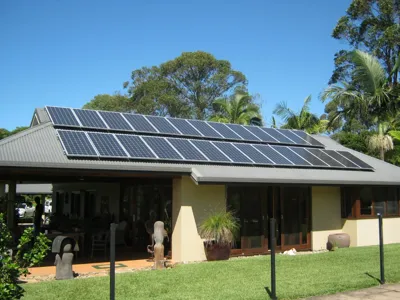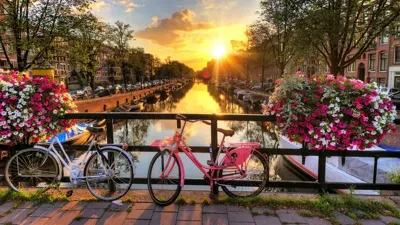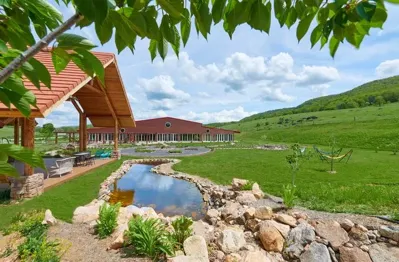As global awareness of climate change and environmental conservation grows, eco-conscious travel has become more than just a trend—it’s a responsible way to explore the world.
![]()
As global awareness of climate change and environmental conservation grows, eco-conscious travel has become more than just a trend—it’s a responsible way to explore the world.
Sustainable travel doesn't mean sacrificing comfort or enjoyment; it means making choices that minimize your impact on the environment. From selecting eco-friendly accommodations to reducing your carbon footprint, there are countless ways to make your journeys greener. This article explores various destinations that offer eco-conscious experiences, with tips on how to get around, where to stay, and what to do, all while keeping the environment in mind.
Additionally, for solo travelers and couples looking to meet like-minded people during their journeys, we’ve included insights on how to find nearby singles or connect through various dating platforms without additional costs.
1. Costa Rica: The Pioneer of Eco-Tourism
Overview:
Costa Rica is a leader in eco-tourism, renowned for its commitment to sustainability. This Central American gem offers lush rainforests, beautiful beaches, and a rich biodiversity that makes it a paradise for nature lovers. With a strong emphasis on conservation, Costa Rica allows travelers to experience luxury in harmony with the environment.
Getting Around:
- Walking and Biking: Ideal for exploring small towns like Monteverde or Puerto Viejo, where attractions and accommodations are often within walking distance.
- Public Buses: Costa Rica’s bus system is affordable and connects major tourist spots, though travel times can be long.
- Car Rentals: Electric and hybrid car rentals are becoming increasingly popular, allowing you to explore with a smaller carbon footprint. Prices range from $30–$60 per day.
Costs:
Costa Rica is mid-range, with daily expenses between $60–$150. Eco-lodges and sustainable resorts offer comfortable accommodations that support local communities, often costing around $100 per night.
Eco-Friendly Highlights:
- Wildlife Sanctuaries: Visit wildlife rescue centers like the Jaguar Rescue Center in Puerto Viejo to learn about conservation efforts and see rescued animals up close.
- Sustainable Adventures: Zip-line through rainforests, hike volcanoes, or take guided tours in national parks, all while supporting conservation projects.
- Organic Farms: Experience farm-to-table dining at organic farms, where you can learn about sustainable agriculture and enjoy fresh, local meals.
Who It’s For:
Perfect for couples, solo travelers, and families looking to immerse themselves in nature while practicing responsible tourism.
Dating Insight:
For solo travelers or couples seeking connections, platforms like Free Dating Sites Without Payment are perfect for meeting like-minded people during your travels without the hassle of fees or hidden costs.
![]()
![]()
![]()
![]()
![]()
2. New Zealand: A Nature-Lover’s Dream with Eco-Conscious Initiatives
Overview:
New Zealand is famed for its breathtaking landscapes, from the majestic Southern Alps to serene coastal beaches. The country is deeply committed to sustainability, with numerous eco-friendly initiatives in place to protect its natural beauty. Whether you're seeking adrenaline-pumping adventures or peaceful escapes, New Zealand caters to every kind of traveler while prioritizing environmental protection.
Getting Around:
- Walking and Hiking: New Zealand is best explored on foot, especially in areas like Fiordland National Park or the Abel Tasman Coast Track, where you can enjoy well-marked trails.
- Electric Campervans: Rent an electric or hybrid campervan for an eco-friendly road trip, costing around $70–$120 per day.
- Public Transport: Buses and trains are available but are more limited outside major cities. Use them when feasible to reduce your carbon footprint.
Costs:
Daily costs range from $80–$200, with eco-lodges and green-certified hotels offering accommodations starting at around $90 per night. Activities like hiking are free, while guided eco-tours and adventures can range from $30–$150.
Eco-Friendly Highlights:
- Glacial Hikes: Take guided tours on the Franz Josef or Fox Glacier with companies committed to environmental sustainability.
- Whale Watching: Kaikoura is renowned for whale watching, and the tours are regulated to ensure minimal environmental impact.
- Maori Cultural Experiences: Participate in authentic Maori cultural experiences that promote indigenous conservation practices and support local communities.
Who It’s For:
Ideal for couples, solo adventurers, and nature enthusiasts who value eco-friendly travel in some of the world’s most stunning natural settings.
Dating Insight:
Those interested in meeting locals or fellow travelers can explore Nearby Singles platforms, which allow you to connect with others in your area without upfront payments or subscription fees.
![]()
![]()
![]()
![]()
![]()
3. Slovenia: Europe’s Green Gem
Overview:
Slovenia, one of Europe’s greenest countries, offers an impressive blend of mountains, lakes, and charming cities. The country is committed to sustainability, boasting eco-friendly accommodations, farm-to-table dining, and a culture that values nature preservation. Ljubljana, the capital, was even named Europe’s Green Capital for its dedication to environmental initiatives.
Getting Around:
- Biking: Ljubljana and other towns like Bled are extremely bike-friendly, with rentals starting at $10 per day.
- Public Transport: Trains and buses are reliable and eco-friendly ways to travel between cities and nature reserves.
- Walking: Most Slovenian towns are compact and best explored on foot, making it easy to reduce your carbon footprint.
Costs:
Slovenia is budget-friendly, with daily expenses between $50–$120. Green hotels and farm stays offer accommodations starting at around $70 per night. Public transport and biking are also very affordable.
Eco-Friendly Highlights:
- Lake Bled: Enjoy the iconic Lake Bled without motorboats; instead, row or paddleboard to the island to reduce water pollution.
- Eco-Resorts: Stay at eco-certified resorts that utilize renewable energy and support local agriculture.
- Cave Exploration: Discover the world-famous Postojna Cave while supporting conservation efforts with guided, sustainable tours.
Who It’s For:
Great for couples, solo travelers, and outdoor enthusiasts looking for a sustainable European getaway with a mix of city and nature.
Dating Insight:
For solo travelers, platforms like Seniors Dating Site provide an opportunity to meet people of similar interests while traveling, offering a fun and cost-free way to connect.
![]()
![]()
![]()
![]()
![]()
4. Japan: Sustainable Sophistication in a Modern World
Overview:
Japan is a country of contrasts, where futuristic cities meet tranquil nature. Beyond its technological advances, Japan is also a leader in sustainability, with a strong focus on eco-friendly practices in both urban and rural settings. From electric transport options to farm stays, Japan offers an eco-conscious experience that’s both luxurious and mindful.
Getting Around:
- Public Transport: Japan’s public transport system, including trains and buses, is one of the most efficient and eco-friendly in the world. A Japan Rail Pass offers unlimited travel on many trains, including the Shinkansen (bullet train), at a reasonable cost.
- Biking: Cities like Kyoto are bike-friendly, allowing you to explore temples and parks with zero emissions.
- Walking: Many Japanese cities are pedestrian-friendly, making walking an easy and enjoyable way to explore.
Costs:
Japan ranges from mid-range to luxury, with daily expenses around $70–$200. Green-certified hotels and ryokans (traditional inns) start at $100 per night, often including meals sourced from local, organic produce.
Eco-Friendly Highlights:
- Onsen Towns: Relax in natural hot springs powered by geothermal energy, such as those in Hakone or Beppu, with eco-conscious resorts.
- Farm Stays: Experience traditional Japanese agriculture and sustainable living by staying on a farm, where you can help with harvesting and enjoy organic meals.
- Sustainable Shopping: Shop at zero-waste stores in Tokyo and Kyoto that offer locally made, eco-friendly products.
Who It’s For:
Perfect for solo travelers, couples, and anyone seeking a blend of modern luxury and traditional eco-friendly experiences.
Dating Insight:
If you’re looking to connect with others while in Japan, consider platforms like Spanish Dating Site, which often feature international travelers and locals alike, providing a great way to meet without financial commitment.
![]()
![]()
![]()
![]()
![]()
5. Iceland: Eco-Adventure in the Land of Fire and Ice
Overview:
Iceland is known for its dramatic landscapes of glaciers, volcanoes, and hot springs, and it’s also a leader in renewable energy, with nearly 100% of its electricity coming from renewable sources. Whether exploring on foot or soaking in a geothermal lagoon, Iceland offers eco-adventures that respect and preserve the natural environment.
Getting Around:
- Walking: Reykjavik is compact and easily explored on foot, with numerous eco-friendly cafes and shops.
- Electric Car Rentals: Iceland’s popularity means traditional car rentals can be expensive, but electric cars are increasingly available for around $80 per day.
- Buses: The bus system is limited outside of Reykjavik, but within the city, it’s an affordable and eco-friendly option.
Costs:
Iceland is on the pricier side, with daily expenses ranging from $100–$250. However, budget-friendly guesthouses and green hotels offer accommodation starting at $90 per night, and many natural attractions, like waterfalls and hiking trails, are free.
Eco-Friendly Highlights:
- Geothermal Pools: Relax in naturally heated pools like the Blue Lagoon, which use sustainable practices to provide a unique, eco-conscious spa experience.
- Glacier Hikes: Join guided hikes on Iceland’s glaciers with companies that adhere to strict environmental guidelines.
- Renewable Energy Tours: Visit geothermal and hydroelectric power plants that showcase Iceland’s commitment to renewable energy.
Who It’s For:
Great for solo adventurers, eco-minded couples, and nature enthusiasts looking to explore some of the world’s most unique landscapes.
Dating Insight:
While traveling solo in Iceland, connecting with fellow eco-conscious travelers is easy with platforms like Free No Pay Dating Sites, allowing you to meet new people without hidden costs or commitments.
![]()
![]()
![]()
![]()
![]()
Personal Insight
Traveling green isn’t just about reducing your carbon footprint; it’s about connecting more deeply with the destinations you visit. By choosing eco-friendly accommodations, supporting local communities, and opting for sustainable transport, you help preserve the beauty of these places for future generations.
As you explore new cultures and landscapes, embracing green travel not only enriches your journey but also fosters a sense of responsibility toward our shared planet. The world is full of incredible destinations that welcome eco-conscious travelers—so take the leap, and enjoy a greener way to see the world.


